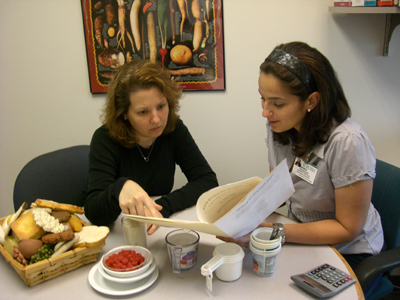Dr. Chapman-Novakofski’s Lab Protocols
Before beginning a research project, students must  have completed the appropriate IRB training. This training is available at irb.illinois.edu. The specific modules to be completed should be discussed with Dr. Chapman-Novakofski. Certificates of completion for each module must be given to Dr. Chapman-Novafokski.
have completed the appropriate IRB training. This training is available at irb.illinois.edu. The specific modules to be completed should be discussed with Dr. Chapman-Novakofski. Certificates of completion for each module must be given to Dr. Chapman-Novafokski.
If a student’s research includes any blood or body fluids, the student must also complete the Institutional Biosafety Committee training. Information about that training is available at www.drs.illinois.edu/ibcprojectregistration.
Protocols for specific research projects are included in the Institutional Review Board (IRB) forms. Each student should have a copy of that form, all accompanying materials, and have read them.
Confidentiality
If working with people on a research project, that person’s participation is confidential. No discussion of a person’s participation in which a person is identifiable is allowable. Any questions about the research from individuals, including news reporters, should be directed to Dr. Chapman-Novakofski.
Data in the lab should not have recognizable identification. All code keys and consent forms are kept by Dr. Chapman-Novakofski.
Computers
The computers in the lab are there for the students’ convenience. Students are not to load software on these computers. Do not leave class projects or papers on the desktop.
If a computer is not working well, contact Dr. Chapman-Novakofski, not CITES or other assistants. The printer is also a convenience. If the ink or paper is low, contact Dr. Chapman-Novakofski. Log off and turn the computer off when you are finished using it.
Data
Hard copies of data must remain in the laboratory files or laboratory area. Data entered into computers must have a back-up file on a CD or jump drive. All data entered must have a quality assurance check by Dr. Chapman-Novakofski.
Equipment
Equipment in the lab is not to be loaned to other students or faculty except when approved by Dr. Chapman-Novakofski. This includes dietary recall materials and books, surveys, body scales, pedometers, bone sonometers, and bioelectrical impedance equipment.
Students must be trained on certain equipment before using it. If you are not sure, ask. If equipment is not working, contact Dr. Chapman-Novakofski as soon as possible.
Phones
There is a phone in the lab that may be used for local calls. Long distance calls related to your research are allowed if cleared by Dr. Chapman-Novakofski.
Safety
Emergency numbers are posted in the lab. The lab door should be set to lock when the door closes at all times. If you lose your key, please let Dr. Chapman-Novakofski know as soon as possible. It is never a good idea to leave valuables within eyesight, but to place them in a drawer or cabinet.
Working Area
Please keep your work area as neat as possible. Food, beverages, or dishes should not be left in shared spaces such as computer tables.
If you are conducting interviews or focus groups in the lab, check your schedule with Dr. Chapman-Novakofski and labmates. If a labmate has the room scheduled, please make other arrangements while the room is scheduled.
Remember that students study at their desks, and to be considerate of them when playing music or talking with others.
Finishing Your Degree
When you have finished your degree requirements, all data, software-entered data, loaned books, copies of your thesis, and powerpoint presentation copies should be given to Dr. Chapman-Novakofski. Lab keys should be turned in to the main Department of Food Science and Human Nutrition office.
